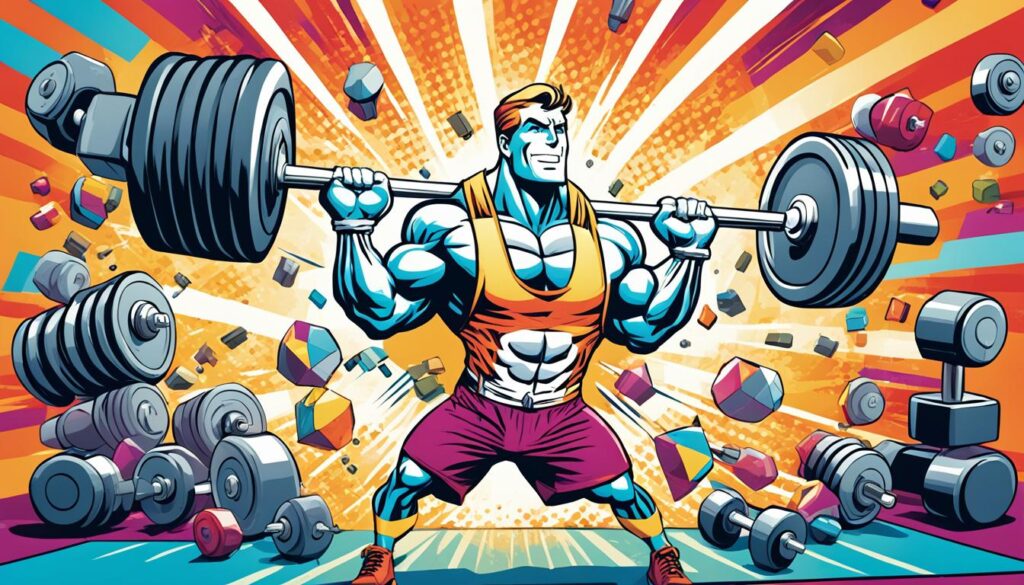Getting Started with can you build muscle without protein
When it comes to building muscle, protein has long been hailed as the holy grail of nutrients. But what if you prefer a diet without protein or simply want to explore alternative strategies for muscle growth? In this article, I’ll dive into the topic of whether it’s possible to build muscle effectively without relying on protein in your diet.
Key Takeaways
- Protein is essential for muscle growth as it provides the building blocks for muscle fibers and aids in their repair and growth.
- Alternative strategies for muscle development include vegetarian and vegan diets, which can be rich in plant-based protein sources.
- Incorporating nutrient-rich foods into your diet can also support muscle growth and development.
- Strength training, with exercises like dumbbell workouts and barbell exercises, plays a crucial role in building muscle.
- While protein is important, exploring alternative approaches can still offer viable options for muscle development.
The Role of Protein in Muscle Growth
When it comes to muscle growth, protein plays a crucial role. It serves as the building block for muscle fibers, promoting their repair and growth over time. Let’s delve deeper into the significance of protein and understand how it supports muscle development.
Protein is made up of amino acids, which are the individual components that come together to form protein molecules. These amino acids are essential for various functions in the body, including the synthesis of new muscle tissue. They act as the foundation for the growth and repair of muscle fibers.
During intense physical activity, such as strength training or resistance exercises, muscle fibers undergo stress and micro-tears. Protein plays a vital role in repairing these damaged muscle fibers, making them stronger and more resistant to future stress.
Moreover, protein is responsible for the synthesis of new muscle tissue. When you consume protein-rich foods, your body breaks them down into amino acids, which are then transported to the muscles through the bloodstream. These amino acids are used to repair and build new muscle fibers, contributing to muscle growth and development.
It’s important to note that not all proteins are created equal. Different sources of protein provide varying amounts of essential amino acids. Animal-based protein sources, such as lean meats, poultry, fish, and dairy products, typically contain all the essential amino acids required for muscle growth. Plant-based protein sources, on the other hand, may lack certain essential amino acids. However, by combining different plant-based protein sources, such as beans, legumes, nuts, and grains, it’s possible to obtain a complete amino acid profile.
“Protein serves as the building block for muscle fibers, promoting their repair and growth over time.”
In summary, protein plays a vital role in muscle growth and development. It provides the necessary building blocks and amino acids to repair damaged muscle fibers and synthesize new muscle tissue. Both animal-based and plant-based protein sources can be incorporated into a balanced diet to support optimal muscle growth.
Alternative Nutritional Approaches for Muscle Growth
In this section, I will explore alternative nutritional approaches for individuals who prefer not to consume animal-based protein. Whether you follow a vegetarian or vegan diet, there are plenty of plant-based protein sources that can support muscle growth. By incorporating nutrient-rich foods into your diet, you can ensure that your body receives all the necessary building blocks to promote muscle development.
Vegetarian and Vegan Diets
Vegetarian and vegan diets have gained popularity over the years due to their health and environmental benefits. These diets exclude meat, poultry, and fish but still allow for a wide variety of other protein-rich foods.
“Following a vegetarian or vegan diet doesn’t mean you have to miss out on protein. There are plenty of plant-based options available that can help you meet your protein needs.” – Dr. Elizabeth Johnson, Nutrition Expert
Plant-based protein sources play a crucial role in satisfying the body’s protein requirements. Here are some examples of plant-based protein-rich foods that can support muscle growth:
| Plant-Based Protein Sources | Protein Content per 100g |
|---|---|
| Soybeans | 16.6g |
| Lentils | 9g |
| Quinoa | 4.4g |
| Chickpeas | 8.9g |
| Spinach | 2.9g |
These plant-based protein sources can easily be incorporated into meals and snacks. For example, you can enjoy a tofu stir-fry, lentil soup, or a quinoa salad to boost your protein intake. Don’t forget to combine different plant-based protein sources to ensure you’re getting a wide range of amino acids, which are the building blocks of protein.
In addition to plant-based protein sources, it’s essential to include other nutrient-rich foods in your diet to support muscle development. Focusing on foods rich in vitamins, minerals, and antioxidants can provide the necessary nutrients for optimal muscle growth. Some examples of nutrient-rich foods include:
- Leafy green vegetables like kale and spinach
- Berries, such as blueberries and strawberries
- Nuts and seeds, such as almonds and chia seeds
- Whole grains like quinoa and brown rice
- Avocado for healthy fats
By incorporating these nutrient-rich foods into your vegetarian or vegan diet, you can provide your body with the necessary fuel for muscle growth.
Remember, it’s important to consult with a registered dietitian or nutritionist when making changes to your diet, especially if you’re following a specific dietary pattern or have specific nutritional needs. They can help ensure you’re meeting your protein requirements and provide personalized guidance based on your individual goals and preferences.
Strength Training for Muscle Growth
In order to effectively build muscle, incorporating strength training exercises into your fitness routine is essential. Strength training helps stimulate muscle growth by challenging your muscles with resistance. In this section, I’ll provide guidance on various forms of strength training exercises that can help you achieve your muscle-building goals.
Dumbbell Workouts
Dumbbell workouts are a versatile and effective form of strength training that can be done at home or at the gym. By using dumbbells, you can target specific muscle groups and increase the intensity of your workout. Some popular dumbbell exercises include dumbbell curls, shoulder presses, and chest presses. These exercises engage multiple muscles and promote overall muscle development.
Barbell Exercises
Barbell exercises are another effective way to build muscle. They allow you to lift heavier weights and engage larger muscle groups. Popular barbell exercises include squats, deadlifts, and bench presses. These compound exercises work multiple muscles at once, promoting strength and muscle growth.
Weighted Exercises
Weighted exercises involve adding additional weight to your body, whether through dumbbells, barbells, or other weighted equipment. These exercises can be done at home or at the gym, and they provide an extra challenge to your muscles. Examples of weighted exercises include weighted lunges, overhead presses with weights, and weighted step-ups. By incorporating weighted exercises into your routine, you can further enhance muscle growth.
When performing strength training exercises, it’s important to focus on proper form and technique. This ensures maximum efficiency and reduces the risk of injury. Additionally, it’s crucial to gradually increase the challenge by progressively overloading your muscles. This can be achieved by increasing the weight, repetitions, or intensity of your exercises over time.

By incorporating dumbbell workouts, barbell exercises, and other weighted exercises into your fitness routine, you can effectively stimulate muscle growth and achieve your muscle-building goals.
Conclusion
After exploring the question of whether it’s possible to build muscle without protein, the evidence overwhelmingly points to the importance of protein intake for optimal muscle development. While alternative nutritional approaches exist and can support muscle growth, protein remains a key component in the process.
Protein provides the essential amino acids that serve as the building blocks for muscle fibers. These amino acids are crucial for repair, growth, and maintenance of muscle tissue. Without an adequate protein intake, the body may struggle to meet the demands of muscle development.
While vegetarian and vegan diets can be viable options for individuals seeking to build muscle without relying on animal-based protein, it’s crucial to ensure adequate intake of plant-based protein sources. Nutrient-rich foods and supplements can also play a role in supporting muscle growth in the absence of traditional protein sources.
In conclusion, while some alternative strategies exist for muscle development, it is clear that protein intake plays a vital role in maximizing muscle growth. Whether from animal or plant-based sources, a sufficient protein intake is essential for supporting the repair, growth, and maintenance of muscle tissue. Therefore, for those aiming to build muscle effectively, it is recommended to prioritize protein intake to optimize muscle development.
FAQ
Can you build muscle without consuming protein?
While protein is essential for muscle growth, it is possible to build muscle without relying solely on protein intake. However, it is important to note that protein plays a crucial role in providing the necessary building blocks for muscle fibers and promoting their repair and growth. Alternative strategies, such as incorporating other nutrient-rich foods and optimizing your training routine, can support muscle development.
How does protein contribute to muscle growth?
Protein is a key component in muscle growth as it provides the building blocks needed for muscle fibers. Protein contains amino acids, which are essential for repairing damaged muscle tissue and facilitating muscle growth. By consuming adequate amounts of protein, you can optimize your muscle-building potential and support overall muscle development.
Are there alternative nutritional approaches for muscle growth?
Yes, there are alternative nutritional approaches for individuals who prefer not to consume animal-based protein. Vegetarian and vegan diets can provide sufficient protein through plant-based sources such as legumes, tofu, tempeh, and quinoa, among others. It is also important to incorporate other nutrient-rich foods such as fruits, vegetables, whole grains, and healthy fats to ensure a well-rounded diet that supports muscle growth.
What are some recommended exercises for muscle growth?
Strength training is crucial for muscle growth. You can incorporate various exercises into your fitness routine, including dumbbell workouts, barbell exercises, and other weighted exercises. These exercises target different muscle groups and promote muscle hypertrophy. It is important to gradually increase the weight and intensity of your workouts, practicing proper form, and allowing adequate rest and recovery for optimal muscle development.
Is protein intake necessary for muscle development?
Yes, protein intake is crucial for optimal muscle development. While there are alternative approaches to support muscle growth, protein plays a significant role in providing the necessary amino acids for muscle repair and growth. It is recommended to consume a sufficient amount of high-quality protein from various sources to support your muscle-building goals.
